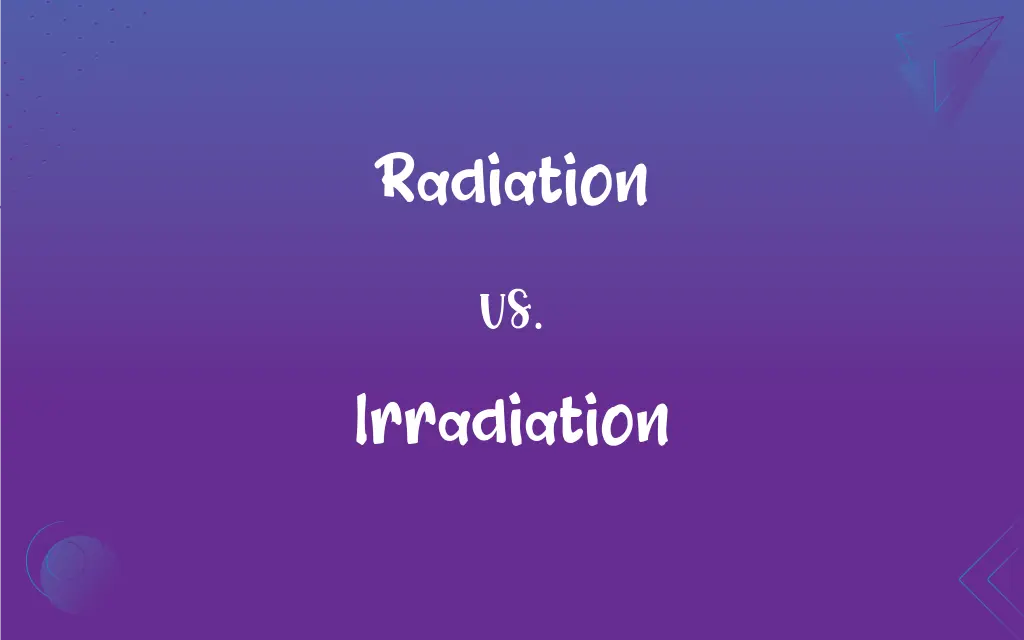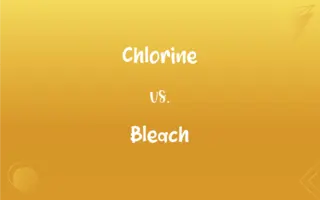Radiation vs. Irradiation: What's the Difference?
Edited by Janet White || By Harlon Moss || Updated on October 18, 2023
Radiation refers to the emission of energy as waves or particles, while irradiation is the process or act of exposing something to radiation.

Key Differences
In the realm of physics and many applied sciences, radiation is a term that denotes the emission of energy as electromagnetic waves or subatomic particles. It's a naturally occurring phenomenon and can be found in various forms, from visible light to more potent forms like gamma rays. Irradiation, on the other hand, specifically references the act or process of exposing an object or substance to radiation, typically for a purpose, such as sterilizing medical equipment or preserving food.
When discussing radiation, it's often in the context of its types, sources, and effects. Radiation can be ionizing or non-ionizing. Ionizing radiation carries enough energy to knock electrons from atoms, potentially causing damage to cells, while non-ionizing radiation, like that from microwaves, doesn't have this capability. Irradiation, when mentioned, often draws attention to its application. For example, food irradiation is used to kill pathogens and extend the shelf life of certain foods.
Understanding the hazards and benefits of radiation is crucial. Prolonged exposure to high levels of ionizing radiation can be harmful, leading to conditions like radiation sickness. However, in controlled environments, radiation is invaluable, as in X-rays or cancer treatments. Irradiation, being an application, needs careful handling. While it offers many benefits, such as sterilizing surfaces or treating certain medical conditions, improper irradiation can pose risks.
From a linguistic standpoint, while radiation is a noun describing a phenomenon, irradiation can be both a noun, describing the act, and a verb, "to irradiate," meaning to expose to radiation. Both terms, while interconnected, serve distinct roles in discussions about energy emissions and their applications.
Comparison Chart
Definition
Emission of energy as waves or particles.
Process or act of exposing something to radiation.
ADVERTISEMENT
Context
Often discussed in terms of types, sources, and effects.
Typically highlighted for its applications and methods.
Potential Risk
Prolonged exposure can lead to health issues.
Improper use can lead to unintended consequences.
Linguistic Usage
Primarily used as a noun.
Can be used both as a noun and a verb.
Interrelation
Refers to the phenomenon of energy emission.
Involves the deliberate application or use of radiation.
Radiation and Irradiation Definitions
Radiation
Energy that propagates through space.
Radiation from distant stars reaches our planet.
ADVERTISEMENT
Irradiation
Exposing something to radiation.
The medical tools underwent irradiation for sterilization.
Radiation
Emission of energy in wave or particle form.
The sun emits radiation in the form of light and heat.
Irradiation
Process to kill pathogens in food.
Food irradiation ensures longer shelf life.
Radiation
Phenomenon observed in various forms like gamma, alpha, and beta.
Radiation therapy often uses gamma radiation.
Irradiation
Treatment with rays or radiations.
Irradiation can be used to purify drinking water.
Radiation
The release of subatomic particles.
Nuclear reactors produce radiation as a byproduct.
Irradiation
Application of radiation for therapeutic purposes.
Cancer tumors can be treated through irradiation.
Radiation
Ionizing or non-ionizing energy emission.
X-rays are a form of ionizing radiation.
Irradiation
Act of radiating or illuminating.
The diamond underwent irradiation to enhance its color.
Radiation
The act or process of radiating
The radiation of heat and light from a fire.
Irradiation
The act of exposing or the condition of being exposed to radiation.
Radiation
Emission or propagation of energy in the form of waves or particles.
Irradiation
The use or application of ionizing radiation, especially in medical treatment and for the sterilization or preservation of food.
Irradiation
An act of irradiating, or state of being irradiated.
FAQs
What is radiation?
Radiation is the emission of energy as electromagnetic waves or subatomic particles.
Is all radiation harmful?
No, only high levels of ionizing radiation are potentially harmful; non-ionizing radiation is generally considered safe.
Why is irradiation used on food?
Irradiation is used on food to kill pathogens, increase shelf life, and reduce the risk of foodborne illnesses.
Are radiation and irradiation synonymous?
No, radiation refers to the energy emission, while irradiation is the act of exposing something to that energy.
What does irradiation mean?
Irradiation is the process or act of exposing something to radiation.
Does radiation have practical applications?
Yes, besides medical uses, radiation has applications in energy, research, and various industries.
Can irradiation change the properties of a substance?
Yes, irradiation can alter the molecular structure and properties of a substance.
What are common sources of radiation?
Common sources include the sun, radioactive materials, X-rays, and certain electronic devices.
Is irradiation used in medicine?
Yes, irradiation is used for sterilizing equipment, and radiation therapy treats certain diseases.
How does irradiation benefit the medical field?
Irradiation sterilizes medical tools and equipment, ensuring safety.
Is radiation always visible?
No, many forms of radiation, like gamma rays or X-rays, are invisible to the naked eye.
Can radiation occur naturally?
Yes, natural sources of radiation include radon gas and cosmic radiation from space.
Is irradiation a physical or chemical process?
Irradiation is a physical process as it doesn't change the chemical composition of a substance.
What's the difference between ionizing and non-ionizing radiation?
Ionizing radiation carries enough energy to remove tightly bound electrons, whereas non-ionizing radiation doesn't.
Does irradiated food become radioactive?
No, the food itself does not become radioactive after irradiation.
How does radiation affect living organisms?
High levels of ionizing radiation can damage DNA, potentially leading to health issues.
Is irradiation used only for harmful radiations?
No, irradiation can be applied using both harmful (ionizing) and non-harmful (non-ionizing) radiations depending on the purpose.
How is radiation detected?
Radiation is detected using instruments like Geiger counters or dosimeters.
Why is irradiation used in gemology?
Irradiation can enhance the color or clarity of certain gemstones.
What are the safety measures for irradiation?
Safety measures include shielding, distance, and time limitations during exposure.
About Author
Written by
Harlon MossHarlon is a seasoned quality moderator and accomplished content writer for Difference Wiki. An alumnus of the prestigious University of California, he earned his degree in Computer Science. Leveraging his academic background, Harlon brings a meticulous and informed perspective to his work, ensuring content accuracy and excellence.
Edited by
Janet WhiteJanet White has been an esteemed writer and blogger for Difference Wiki. Holding a Master's degree in Science and Medical Journalism from the prestigious Boston University, she has consistently demonstrated her expertise and passion for her field. When she's not immersed in her work, Janet relishes her time exercising, delving into a good book, and cherishing moments with friends and family.































































